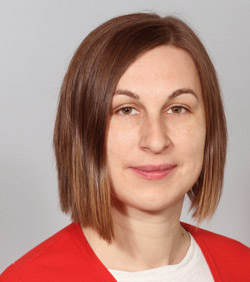
SPEAKER PROFILE |
 Dr. Marija Plodinec Department of Pathology, University Hospital Basel & Biozentrum and The Swiss Nanoscience Institute, University of Basel SWITZERLAND |
The nanomechanical signature of cancer progression
Abstract
Nanomechanical alterations on the (sub-) cellular level in cancer are associated with the changes in the cell cytoarchitecture metabolism that are representative of cancer aggressiveness. Therefore, we have developed an atomic force microscope (AFM)-based diagnostic apparatus known as ARTIDIS (“Automated and Reliable Tissue Diagnostics) that allows for the quantitative nanomechanical profiling of unadulterated tissue at submicron spatial resolution and nano-Newton (nN) force sensitivity in physiological conditions. In this manner, one obtains a quantitative biopsy-wide nanomechanical profile or signature that correlates with the tissue status and health. Our findings have lead to the first clinical application of AFM with the aim to optimize cancer diagnosis, orientate therapy choice, and support patient follow-up.
Bio
I am interested in understanding the mechanisms that govern nanomechanical changes during tissue development and cancer progression by investigating:- Extracellular matrix associated pathways,
- Cell cytoarchitecure and metabolism
- The clinical application of the nanomechanical signature of breast cancer (Plodinec et. al., Nat Nanotechnol. 2012 Nov;7(11):757-65).
- Bsc. in Phsics (2005) from the University of Zagreb
- Phd in Biophysics (2010) from the University of Basel with the thesis entitled
- "Probing the determinants of cellular elasticity by AFM"
- Co-inventor of the ARTDIS® technology together with the Prof. Roderick Lim and Dr. Marko Loparic
- Co-inventor on several patents that describe use of AFM and the surface nanotopography for applications in clinics